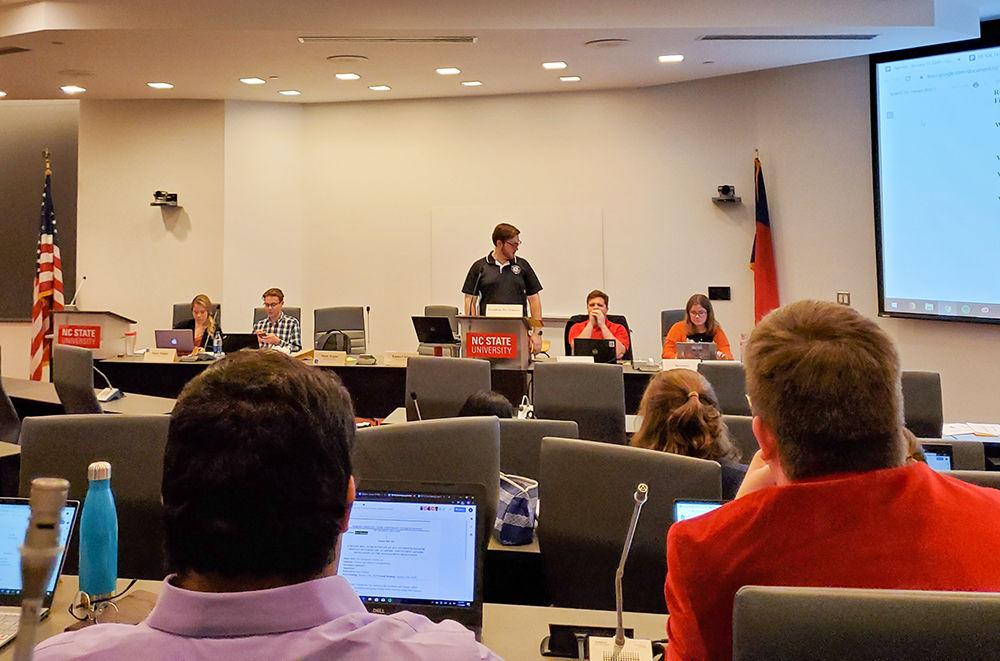Student senators met for the first time in the spring 2020 semester Wednesday, Jan. 15 in a fairly brief meeting to double the voting period in future Student Government elections from 24 to 48 hours, appoint six senators to empty seats and voice support for reform in the student organization registration process.
- Cassondra Newman, a first-year Ph.D. student in crop science, was appointed to the Graduate and Lifelong Education delegation.
- Skyler Futrell, a first-year studying political science, was appointed to the College of Humanities and Social Sciences delegation.
- Grant Goodman, a first-year studying horticulture, was appointed to the College of Agriculture and Life Sciences delegation.
- Ethan Renfro, a first-year studying agricultural education, was appointed to the College of Agriculture and Life Sciences delegation.
- Nathan Ellis, a second-year studying environmental engineering, was appointed to the College of Engineering delegation.
- Rishabh Gupta, a first-year Ph.D. student in electrical engineering, was appointed to the Graduate and Lifelong Education delegation.
R 62 – Student Organization Registration Act — Unanimously Passed
The past two academic years have been a challenge for student organizations with regard to the registration process, according to Graduate and Lifelong Sen. James Withrow, a Ph.D. student in biology and entomology and president of the Graduate Student Association (GSA).
This legislation seeks to encourage Student Involvement, which oversees student organization registration, to make changes and streamline the process, something that is already in progress.
SR 95 – Elections Timeline Act — Narrowly Passed After Debate
This legislation simply seeks to extend the time students have to vote in Student Government elections. Voting is done in the week before spring break, starting Monday at 8 p.m. and ending Tuesday at 8 p.m. With this resolution, the period would begin Monday at 12:01 a.m. and end Tuesday at 11:59 p.m., doubling the time students have to vote.
The initial rationale for the resolution was that increasing the voting period may lead to increased turnout. Several senators opposed this out of fear it would lead to candidates stretching themselves thin on election days. However, Poole College of Management Sen. Thomas Walsh, a second-year studying business administration, said just the opposite, arguing this would make elections more accessible to those with busy class schedules, as they would be allotted more time to campaign.
The change would take effect in the fall 2020 semester and would not affect the upcoming spring elections.
The resolution passed on a slim margin, with 20 votes in support, 17 against and two abstentions.
R 96 – The Paperless Submissions Act — Unanimously Passed
This resolution encourages the university to explore policy options in the future, which would both create free printing resources for students and increase the use of digital materials in courses.
R 97 – Gender Inclusive Housing Act — Unanimously Passed
This resolution calls on the university to provide gender-inclusive housing for transgender and gender nonconforming students. This mirrors recent legislation put forth in the UNC System’s Association of Student Governments, which is pushing for similar policy change.
SB 104 – Hui Delegation Switch Act — Unanimously Passed
Academic and Student Affairs Sen. Christian Hui, a second-year in business administration and computer science, was elected in spring 2019 under the delegation of the Division of Academic and Student Affairs, but is seeking to change his delegation to the Poole College of Management, which his degree program of business administration falls under.
FB 111 – Cybathlon Funding Act — Narrowly Failed After Debate
This bill aims to contribute $750 to a student organization through the finance committee in order to pay for competition expenses. The competition, Cybathlon, is an event in which people with physical disabilities compete with the aid of technology.
Several senators took issue with the budget of the student organization, noting that with contributions from the Student Government finance committee would put them well over their operating expenses. Additionally, the budget did not account for spring appropriations funds, which the club planned on requesting, or funding through College of Engineering programs.
The bill failed by a margin of one vote, with 19 votes in support, 20 against, and eight abstentions.








